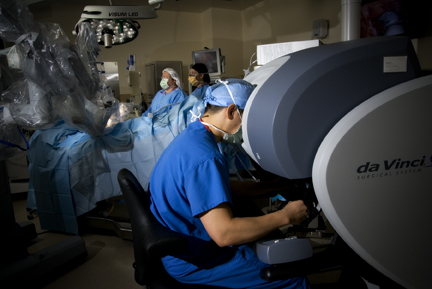
Surgery is a common part of the cancer treatment journey. It plays a critical role in diagnosing, staging, and treating cancer, and often involves the removal of tumors or cancerous tissue from the body. Advances in surgical techniques, including minimally invasive and robotic surgeries, have revolutionized cancer treatment, allowing for more precise procedures with fewer risks and quicker recovery times.
Northeast Georgia Health System’s comprehensive cancer program offers chemotherapy, radiation oncology, advanced diagnostics and surgical techniques, as well as wrap-around support through our patient navigation program or cancer rehabilitation.
For more information about surgical oncology procedures available at Northeast Georgia Health System, call 770-219-8815 or meet our surgical oncologists.
Cancer Surgery Options
Minimally invasive cancer surgery is surgery performed through small incisions. Using specialized techniques (either laparoscopically or robotically with the da Vinci Surgical Robot), miniature cameras with microscopes, tiny fiber-optic flashlights and high-definition monitors, the entire operation is performed through an incision that requires only a stitch or two to close.
Minimally invasive cancer surgery allows the patient to recover more quickly with less pain and blood loss.
Radiofrequency ablation works by inserting a thin needle guided by computed tomography (CT) or ultrasound through the skin and into a tumor. Electrical energy delivered through this needle heats and destroys the tumor. During the following months, dead cells turn into a harmless scar. During the short RF ablation treatment, patients are under general anesthesia.
In most cases a tumor can be adequately treated with one treatment session. A treatment takes about 15 minutes. Typically, RF ablation creates a zone of tissue destruction 3 – 5 centimeters in size.
After treatment, patients spend a night in the hospital and go home the next day. The procedure can be repeated if new cancer appears.
The surgeons of Northeast Georgia Health System participate in national research trials with the goal of improving surgical care for cancer patients. View our list of current clinical trials.
Reconstructive surgery is performed by plastic surgeons who reconstruct the area affected by surgical cancer removal.
Surgery by Cancer Type
Northeast Georgia Health System treats many different types of cancer. Below are some of the most common cancers we treat and the surgical options we offer.
Breast cancer surgery often involves the removal of malignant tissue to control the spread of cancer. Common procedures include:
- Lumpectomy: Removal of the tumor and a small amount of surrounding tissue.
- Mastectomy: Removal of one or both breasts to prevent cancer from spreading.
- Sentinel Lymph Node Biopsy: Removal of the first lymph node to check for cancer spread.
- Breast Reconstruction: Surgery to restore the appearance of the breast following mastectomy.
Colorectal cancer surgery is often recommended to remove growths from the colon, rectum, or anus. Our surgeons perform both minimally invasive and robotic surgeries, which lead to smaller incisions and quicker recovery. Common procedures include:
- Robotic Colectomy: Removal of a section of the colon.
- Robotic Proctocolectomy: Removal of the colon and rectum for more advanced cases.
- Robotic Abdominoperineal Resection (APR): Removal of the anus, rectum, and part of the colon.
Lung cancer surgery can remove cancerous tissue or a lobe of the lung. Northeast Georgia Health System offers unique options through robotic lung cancer surgery and robotic ion bronchoscopy.
For prostate cancer, we offer advanced robotic surgeries such as radical prostatectomy to remove cancerous tissue while preserving surrounding organs. Our robotic urological surgeries provide patients with the benefits of smaller incisions, less blood loss, and faster recovery times.
Other urological procedures we offer include nephrectomy (kidney removal) and cystectomy (bladder removal).
Other Treatment Options
A stereotactic breast biopsy is a safe and minimally invasive form of breast biopsy. It is used to obtain tiny samples from an abnormal breast mass for examination by a pathologist. Biopsies are the only definitive way to confirm if a breast abnormality is benign (non-cancerous) or not.
The sentinel lymph node is the first lymph node to which cancer is likely to spread from the primary tumor. Cancer cells may appear in the sentinel node before spreading to other lymph nodes. In some cases, there can be more than one sentinel lymph node.
SLN biopsy is a procedure in which the sentinel lymph node is removed and examined under a microscope to determine whether cancer cells are present.
Endoscopic Ultrasound (EUS) allows:
- better visualization of the digestive tract and pancreas to help determine the size and location of tumors in the pancreas and whether cancer has spread to nearby blood vessels and organs
- passage of a needle into the tumor to obtain samples for a quicker and more accurate diagnosis
At Northeast Georgia Medical Center, EUS is performed by Neeraj Sharma, MD, of Gastroenterology Associates of Gainesville.
Choose NGHS for Surgical Oncology
At Northeast Georgia Health System, our team of expert surgeons and oncologists provides the highest quality care for your cancer diagnosis. We offer a comprehensive range of surgical treatments, supported by the latest technologies and personalized support through every stage of your journey.
Contact us today to learn more about our surgical oncology services or to request an appointment with one of our surgeons.

